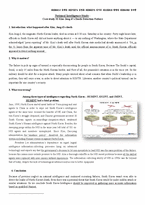김정일 사망과 우리나라 안보에 대하여(영문)
2. Why it matters?
3. What was wrong?
4. Conclusion
1. Introduction: what happened after Kim, Jong-il’s death
Kim Jong-il, the enigmatic North Korean leader, died on a train at 8:30 a.m. Saturday in his country. Forty-eight hours later, officials in South Korea still did not know anything about it — to say nothing of Washington, where the State Department acknowledged “press reporting” of Mr. Kim’s death well after North Korean state media had already announced it. Yet, in the 51 hours from the apparent time of Mr. Kim’s death until the official announcement of it, South Korean officials appeared to detect nothing unusual.
2. Why it matters?
The failure to pick up signs of turmoil is especially disconcerting for people in South Korea, Because The South’s capital, Seoul, is only 35 miles from the North Korean border, and First of all, the peninsula’s situation is in the truce yet. So the military should be alert for a surprise attack. Many people worried about a bad scenario that when North’s leadership is in problem, they will seize a war, in order to divert attention to SOUTH. Likewise, another country’s political turmoil can be important for one country’s security.
3. What was wrong?
Among three types of intelligence regarding North Korea ; HUMINT, SIGINT, and IMINT,
HUMINT had a fatal problem.
June, 1999, North Korea started naval battle at Yeon-pyung and sent agents to China in order to wipe out South Korea’s intelligence agents at the same time. Around the boarder of NK and China, the two Korea’s struggle deepened, and Chinese government arrested 30 South Korean agents in camouflage companies which weakened South Korea’s Human intelligence against North Korea. Besides, the sweeping purge within the NIS in the same year left total of 581 ex-NIS agents and members unemployed. Since Kim, Dae-jung administration, the “sunshine policy” dissolved the information system including Humint resources against North Korea.





 분야
분야


